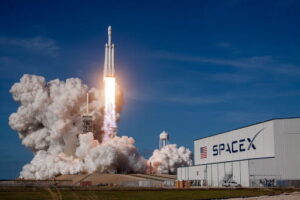by The Cowl Editor on October 3, 2021
National and Global News
 On Saturday, Sept. 18, “SpaceX” and, more specifically, Elon Musk opened our eyes to an era of commercialized space tourism. Musk’s “SpaceX Dragon” Capsule carried a crew to space without an astronaut onboard for the first time in history. These four space travelers landed after a complete orbit around the globe. This success in space exploration signifies that people with the monetary means can now go to space.
On Saturday, Sept. 18, “SpaceX” and, more specifically, Elon Musk opened our eyes to an era of commercialized space tourism. Musk’s “SpaceX Dragon” Capsule carried a crew to space without an astronaut onboard for the first time in history. These four space travelers landed after a complete orbit around the globe. This success in space exploration signifies that people with the monetary means can now go to space.
Elon Musk’s journey to space has become a gradual and incredibly reputable feat. In early 2001 Musk wanted to revolutionize agriculture by curating a “Mars Oasis,” growing plants on Mars soil. Due to budget setbacks, along with Musk’s lack of experience, the idea of Martian agriculture was not funded. The failed idea led Musk to found SpaceX in 2002, an American aerospace manufacturer and space transport services company. Within the decade, Musk orchestrated his first orbital launch, breaching reusability milestones and attaining NASA’s support.
The reusability milestones are notable in Musk’s overall goals to be environmentally and monetarily efficient in use of transportation resources. In the 2010s, the company rapidly expanded its achievements, and became the leading global commercial launch provider. The advancements and power Musk holds in the space industry with SpaceX is an indisputable front runner when it comes to future commercialized space travel.
Though we do not all have $55 million lying around to purchase a Space-X ticket, we have revolutionary activity among us. Considering the high market price for these trips is being paid, there is a space demand. This demand for space tourism indicates a long-term future international asset to the economy. Who knows how speedy and price-efficient the upcoming advances might be?
For example, CNN reported on the Gateway Foundation’s plans for the “World’s first space hotel scheduled to open in 2027.” This hotel is just beginning to embark on a future potential “Starship Culture” based on the increasing demands for space living, working, and habituation. There could be a lifestyle opportunity in space if the technological criteria meets the need to live comfortably. Rather than an utterly dystopian feel to the hotel, the article described how it would aim to bring earth-like living to space. This earth-like living includes restaurants, comfortable suites, and recreational space with activities that highlight the aspects you cannot experience on earth. The reduced gravity alone is a thrilling aspect that almost everyone on our planet has not encountered, along with the unmatched views. Imagine a time when tourists consider heading to space instead of the Amalfi Coast and Disney World.
According to NASA, “The Global Exploration Roadmap” suggests building a space station as an orbital base to send travelers back and forth to the Moon. The station could provide a more stabilized destination grounded in the Moon’s orbit rather than floating freely. Again, the attainability and timeline are unclear, but space is in the future, and these events inch us closer.
Maybe we will not be riding around in the Millennium Falcon any time soon, but this event still stands as an international step forward in commercial space travel.